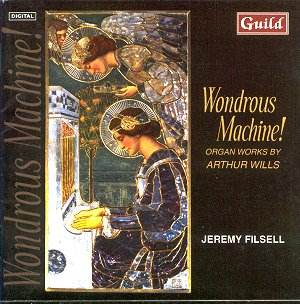 |
Arthur WILLS (born 1926)
WONDROUS MACHINE! Organ works by Arthur WILLS (born 1926) Postlude Arioso and Intermezzo from Five Pieces Carillon on "Orientibus Partibus" Song without Words Prelude and Fugue "Alkmaar" Scherzo-Fantasy "The Ely Imps" Wondrous Machine High Hills and Stony Rocks Variations on a Carol New Millenium Rag Jeremy Filsell on the organ of Tonbridge School Chapel Recorded: Tonbridge School Chapel, October 2000 GUILD MUSIC GMCD 7225 [77:37] Crotchet AmazonUK AmazonUS Amazon recommendations |
Choirmaster, organist and professor at the Royal Academy of Music until 1992, Arthur Wills is also a distinguished composer whose output includes an opera Winston and Julia based on Orwell's 1984, several song cycles, an Organ Concerto, a suite for organ and brass The Fenlands and - of course - a good deal of organ music of which the present release offers a fine cross-section (mainly of works written over the last twenty years or so).
Nevertheless, the earliest pieces here are the Postlude of 1959. This, quite appropriately, rounds off this splendid release and there are also two movements (Arioso and Intermezzo) from his Five Pieces (1961). The song-like Arioso is based on material from the slow movement of the orchestral symphony submitted for his Doctoral degree at the University of Durham in 1958, whereas the Intermezzo is a more varied, colourful piece exploiting the organ's resources to the full.
The CD opens with Carillon on "Orientibus Partibus" (1976), a brilliant Toccata in all but name. It is based on a tune known as "The Song of the Ass". A colourful, lively opener indeed.
Song without Words of 1994, subtitled "In Memoriam Sergei Rachmaninov", was written after the composer had abandoned the idea of transcribing Rachmaninov's Vocalise. It evokes Rachmaninov's ubiquitous piece in a remarkably restrained way and is really moving.
The Prelude and Fugue "Alkmaar" was written in 1971 for a concert in Alkmaar, in the Netherlands. Wills first thought of playing an earlier, similarly titled, piece written in 1963 which proved unfit for the Alkmaar organ. Wills then replaced it with this new piece.
The Scherzo-Fantasy "The Ely Imps", completed in 1994, brilliantly evokes the curious grotesque known as "The Ely Imps" - a delightful, colourful "impish" Scherzo. It is based on the plainchant Sequence used on the Feasts of St Ethelreda. Wills also used this in three other works.
The longest and most ambitious piece here is Wondrous Machine!, subtitled "A Young Person's Guide to the Organ". Britten's celebrated orchestral piece, a Variations-and-Fugue on a theme by Henry Purcell is its pattern. The theme is from Purcell's Ode Hail, Bright Cecilia on Nicholas Brady's poem celebrating. the "superlative majesty of the organ above all other instruments". This efficiently and brilliantly conceived work displays the many expressive facets of the King of Instruments. The variations, all fairly short, are well contrasted and even include a delightful Rag redolent of Scott Joplin. The whole set is capped by a lively, brilliant and imposing Fugue. This superb piece is for narrator (Wills himself in this recording) and organ, although we are not told whether or not the narrator's part is optional.
Another brilliant Scherzo, High Hills and Stony Rocks, of 1990 is followed by another major work, Variations on a Carol, (1965) which might also have been subtitled "A Young Person's Guide to the Organ" for the variations on an original carol composed by Wills in 1965, are also designed to exploit the many colours and tonal contrasts of the instrument. I am in no doubt that this is a major work that deserves wider exposure. It should be eagerly picked up by enterprising organists.
The New Millenium Rag (1999) evokes "the bands that Louis Armstrong grew up with" rather than Scott Joplin's spirit as was the case in the eighth variation of Wondrous Machine! This is a truly delightful piece that should also be popular with organists and audiences alike.
Jeremy Filsell is excellent throughout this demanding, though highly enjoyable, selection of Wills' superbly crafted, varied and colourful music. A most welcome release to be enjoyed not only by organ buffs but also by all those who respond to the organ music of Leighton or Mathias.
Hubert Culot